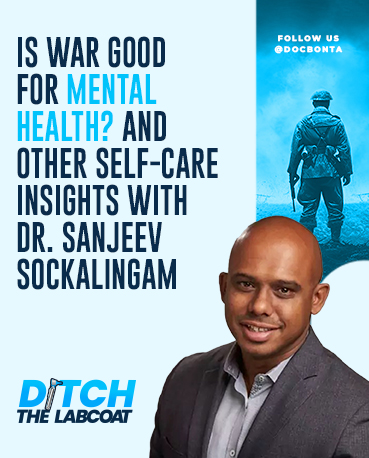Let’s talk self-care.
No, not the Instagram-yoga-retreat-candlelit-bath kind of self-care (though, hey, no judgment). We’re talking about the gritty, evidence-based stuff. To help me unpack this, I welcomed Dr. Sanjeev Sockalingam, psychiatrist extraordinaire and VP of Education at the Centre for Addiction and Mental Health (CAMH), to explore self-care, mental health, and yes, whether war might be good for us.
War: The Surprising Mental Health Boost (Sort of) 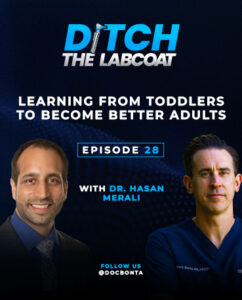
Sebastian Junger’s Tribe kicked off our conversation. It makes the bold claim that war—or rather, the unity it fosters—might improve mental health. Sounds outrageous? Dr. Sockalingam walked us through this paradox.
In times of crisis, when society rallies together for survival, there’s a sense of collective purpose. Modern research backs this: mental health issues like anxiety and depression sometimes decrease in wartime communities as people prioritize the collective over individual woes. But before you pack your bags for the next battlefront, know this: the aftermath is rarely rosy. Trauma, PTSD, and long-term psychological scars are common—and the resilience shown in the moment doesn’t erase those future risks.
Takeaway? It’s not the war itself but the tribe—the shared purpose, connection, and community—that’s the balm for mental health.
Pick up a Book to Read:
Because Dr. Hasan Merali encourages us all to read more like Toddlers:
Are We in a Mental Health Epidemic or Just Naming More Stuff?
In a world where every emotion has a hashtag and every habit might be labeled an addiction (looking at you, doom scrolling), it’s easy to feel overwhelmed by talk of a mental health crisis. Dr. Sockalingam explained that while severe mental illnesses—like psychosis and bipolar disorder—have existed for centuries, the landscape has shifted with new labels for subtler conditions.
Yes, we’re diagnosing more. But it’s not just because society has gotten softer. Increased awareness and destigmatization mean more people are seeking help. However, the line between clinical conditions and normal human emotions can blur. Feeling sad after a breakup? That’s life. Feeling so low you can’t function for weeks? That’s depression.
Self-Care: The Real Deal
Not everyone needs therapy or medication to navigate life’s bumps. Dr. Sockalingam shared some timeless self-care strategies that have stood the test of history—and science.
- Social Connection
Loneliness is more than just a bad mood; it’s a public health crisis. Connecting with others—whether it’s a close friend or a book club—can combat depression and anxiety. - Sleep Is a Vital Sign
Sleep isn’t just beauty rest—it’s mental health rest. Skip the late-night scroll, set a routine, and protect your brain from the chaos of poor sleep. - Exercise for the Mind
Exercise isn’t just for your abs; it’s for your neurons too. Moderate activity can combat mild depression and improve overall mental resilience. - Cut the Harm
When you’re down, it’s tempting to self-medicate with alcohol, junk food, or the sweet oblivion of a Reddit binge. Resist. These habits often make things worse. - Find Joy and Purpose
It’s not all kale smoothies and 10K steps. Purpose, whether it’s raising kids, volunteering, or simply finding joy in a daily routine, is key to long-term mental health.
Head to the Podcast Episode 20 Episode 31 Episode 32
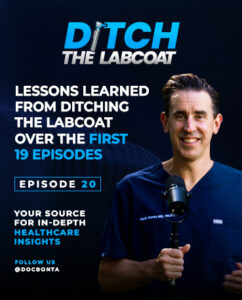
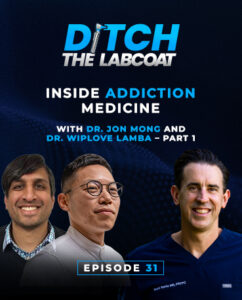

Mindfulness: A Panacea or a Placebo?
Mindfulness is everywhere—schools, corporate offices, your mom’s yoga class. But does it actually work?
The science says yes… and no. Dr. Sockalingam explained that while mindfulness-based therapies are effective for conditions like anxiety and depression, blanket programs (like those rolled out in schools) don’t guarantee results. Mindfulness is a tool, not a cure-all. When tailored to the individual, it can help quiet the “emotional salad spinner” (his words, not mine).
Can Purpose Be Prescribed?
Purpose isn’t one-size-fits-all. It evolves, and psychiatrists often help patients find theirs. Whether it’s transitioning from a career to retirement or recovering from a crisis, purpose gives life meaning. For some, it’s parenting. For others, it’s community service or rediscovering hobbies.
Dr. Sockalingam’s advice? Start small. Purpose isn’t handed to you—it’s discovered, one step at a time.
Talk Therapy: It’s Not All “Tell Me More”
Let’s debunk some myths about therapy. First, not every psychiatrist has a Freudian chaise lounge (though apparently, some still do, for nostalgia). Modern therapy has evolved into structured, evidence-based approaches like cognitive-behavioral therapy (CBT).
But here’s the kicker: no matter the method, the relationship between therapist and patient—the “therapeutic alliance”—is the strongest predictor of success. It’s not just about spilling your guts; it’s about trust, empathy, and feeling heard.
Destigmatization: How Far Have We Come? 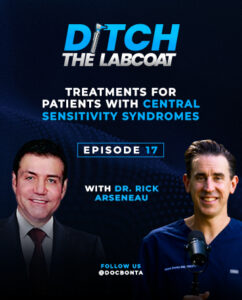
Mental health has come a long way since the “just snap out of it” days. Thanks to advocacy and education, it’s now more accepted to seek help and recognize conditions like depression as legitimate illnesses.
But we’re not there yet. Funding disparities between mental and physical health remain stark. Some conditions—like fibromyalgia or chronic fatigue syndrome—still lack biomarkers, making them harder to diagnose and legitimize. Dr. Sockalingam believes that while society is talking more about mental health, there’s work to be done in ensuring equitable access to care.
Know more through the Podcast Episode 17
Final Thoughts
Dr. Sockalingam left us with this: self-care is about balance, not perfection. Whether it’s better sleep, finding purpose, or resisting the pull of doom scrolling, incremental changes can make a big difference.
As for me, I’m still working on the “put down the phone” part of self-care. But hey, progress is progress.
Thanks, Sanjeev, for reminding us that mental health isn’t just about therapy or medication—it’s about how we live, connect, and find meaning every day.
Until next time, ditch the lab coat, embrace the conversation, and get some sleep.
Dr. Mark Bonta is a general internist, parent, and the host of the Ditch the Labcoat Podcast. He is currently resisting the urge to scroll Reddit as everyone else in the house is asleep.

